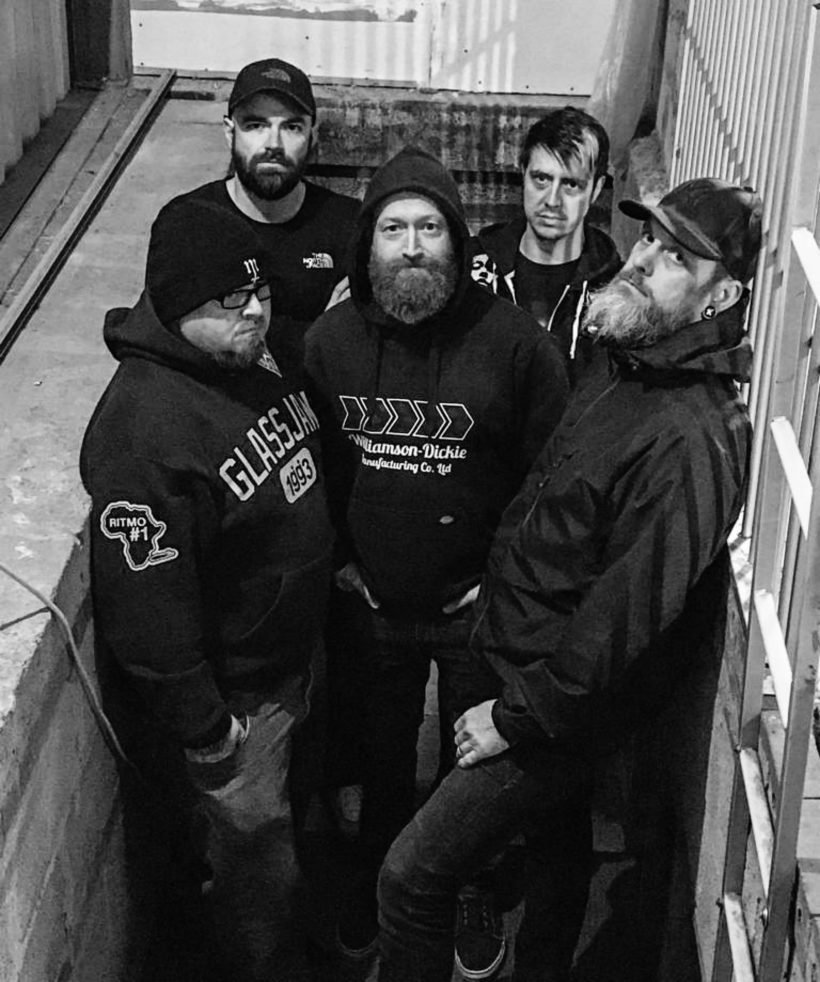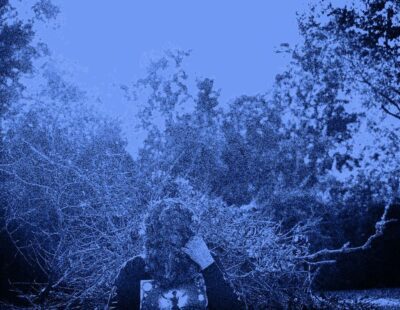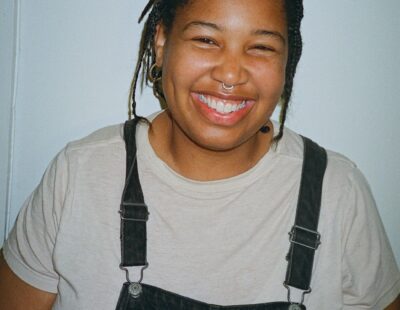
English quintet Mastiff have been grinding for the last five years, gigging as much as possible and independently releasing music, which has earned them recognition in their native England. With their second album, and first for new label APF Records, Plague, they should land right in the angry hearts of American heavy music listeners.
Today, Decibel has acquired a stream of “Vermin,” the fifth song on the album. Mastiff’s brand of feedback-heavy sludgecore is clearly on display, offering one side of their sound. The rest of the record, as you’ll find when it’s released on February 1, includes plenty of doom and even a little grind. Decibel chatted with guitarist James Lee to get the lowdown on Plague, “Vermin” and what the band has been up to. Check it out after the video.
Mastiff have had a few releases before Plague, including the album Wrank, which came out in 2016. How do you think your sound evolved since then?
Wrank feels, both figuratively and kinda literally, like the work of a different band. Back then Mastiff were far more rooted in the traditional sludge sound, and though that can’t be completely attributed to the members who aren’t in the band anymore, I think the guys who stayed in the band were all pushing for a more varied and generally intense vibe. Even our last EP, BORK, feels more like a stepping stone than a full reboot of what Mastiff is. When we recorded BORK, I’d been in Mastiff for about 6 months and Dan (Dolby, bass) not even 2, and though I contributed to most of the songs on it, I don’t think we’d really figured out what this version of the band was yet. By the time we’d gigged that EP for a while and this line-up had really gelled, the vision for whatMastiff is now really started to bleed out of us. Overall I think Mastiff is a much nastier, aggressive beast now than it was a couple of years ago, and based on the ideas we’ve been kicking around in the practice room recently, it’s only going to get worse.
Plague was recorded live in one room in the summer of 2018. How do you feel those conditions affected the final sound of the album?
We’d love to say that recording as quickly as we do is 100% an artistic decision, but the reality is that we’re not a band that makes a crap-load of money just yet, so a couple of days in the studio is pretty much as far as our budget stretches. That said, even if we were afforded a bit more time, we definitely work best when all five of us are raging together, so given the option we would still probably just set us all up in a room and bash through it anyway. Having that time pressure on us means we have to really prepare ourselves and make sure we’re on top of our shit, which I think makes for better performances from us anyway, and creates a kinetic energy you can’t replicate when tracking instrument-by-instrument. We practiced the fuck out of the songs for a couple of months leading up to recording, and though there are still a couple of little flubs here and there (because lord knows we’re not the most technically gifted musicians out there), they give the album life – it’s not processed and falsified to the point where what you hear couldn’t ever be reasonably recreated live. Ultimately we’re best as a live experience, and I believe it’s important that our recordings reflect that. It helps that our producer, Mikey Scott, is the easiest guy to work with in the world. He’s recorded everything from Wrank onward, and he just gets what we’re going for, so it’s really easy for us to turn up at his studio, set up and play, and know that he’s capturing the best possible version of what we’re doing. Also, we recorded it on what was, I believe, one of the hottest weekends in the last 30 years in the UK, so the sheer disgusting amount of sweat and stink in that room definitely brought the worst out in us.
Yeah, Mastiff is very much a conduit for all the negative impulses that flow through the five of us. If you met any of us in person you’d probably be a little taken aback at how relaxed and generally affable we are, because every single drop of anger and hatred in our beings is squeezed into our music. Jim (Hodge, vocals) writes all of the lyrics, and though he doesn’t always sit us down and talk us through the intricacies of what each song is about – largely because the topics are often fairly personal for him – it’s not hard to get the general feeling he’s trying to get across. A fairly prevalent theme you’ll find in our songs is grief and personal loss. We’ve all been through some kind of deep personal tragedy, and the emotions that come along with that – frustration, blame, sorrow, anger – definitely bring out the most aggression in us. The new album, Plague, is slightly less personal in its overarching theme, which deals with the way social media has run rampant on humanity’s ability to really communicate with each other. Everyone lives behind a screen nowadays, and as time goes on the disparity between who we actually are and the people we project ourselves as being is only growing larger. Aside from the inherent falseness that creates, I think it also allows people to disconnect from their morality a little, and we kind of turn into monsters because it feels like there’s no consequence for the way we act online, and that is having a massive corrupting influence on our souls.
Musically, Plague is all over the place, dipping into sludge, doom, hardcore and grind throughout the album. How do you define your sound?
Taking a step back and looking at our last release, BORK, it became clear that whilst we’d managed to broaden the sonic palette that Mastiff could pull from, at times it didn’t really even sound like the same band from song to song. Our goal with Plague was being able to incorporate sounds from the areas of heavy music we were all most passionate about, but make them tonally consistent and sound like they actually belong together on the same album. Historically Mastiff has always had sludge at its heart, and it was important that we kept that grimy, dissonant core. When me and Dan joined the band, though, we brought with us more of a grind and noisecore influence that hadn’t been there before, and it was in making that work within the limits of what was already functioning for the band that was the challenge. It helps that we’ve got Mike (Shepherd, drums) sat behind the kit, his background is in thrash so I think bringing faster stuff to the table lit some long-dormant fire under him, and his playing on the record – especially when we start busting out the blast beats – is fucking awesome. Also, having that grind sound at one end of the spectrum kinda pushed the doomy stuff even further in the other direction, and that’s how you end up with “Black Death,” which is about as slow and harrowing as we could get. So whilst we’re all over the place tempo-wise, I think what marries it all together and makes it work is that harsh, unrelenting atmosphere that I think we’ve really nailed on this album. We worked really hard to make sure nothing that could be conventionally described as ‘melody’ every really peeks its head out on Plague – we wanted it to feel both unmanageably heavy and really claustrophobic, like being buried alive under cement.
We’re premiering the video for “Vermin.” Can you tell us about the process of writing the song and making the video?
We were actually pretty certain that ‘Plague’ was done, and we’d moved on to working on something new that was originally intended for a split with one of our label-mates. Phil (Johnson, guitar) had this idea for the intro with the syncopated snare/guitar chugging, we got that nailed and just kinda went from there, building the song section by section until, about an hour later, we had “Vermin.” We knew pretty much straight away that the song had to be on the album, so we had to break it to the label that the split probably wasn’t going to happen, which we felt bad about, but we had to put our album first and this song definitely became the centerpiece of it. We all grew up whilst the whole late 90’s/early 00’s metalcore thing was happening, and when I joined Mastiff I really wanted to bring some of that sound in with me, and when this track started coming together it seemed a natural fit to throw those ugly, discordant ‘panic chords’ over the top, which gave it this cool Zao/Martyr AD feeling. That era informed our vision for the video too, we very intentionally wanted that Darren Doane-style ‘rocking out in a washed-out warehouse’ look to it. I think our exact brief for Joey Aitchison, the director, was ‘it needs to look like an old Norma Jean video that someone taped from the TV, but then left the VHS tape in a damp garage for 15 years.’ I think he understood, because that’s very much what we ended up with, and we’re all really happy with how it came out. Sorry, not happy. Mastiff don’t do happy.







